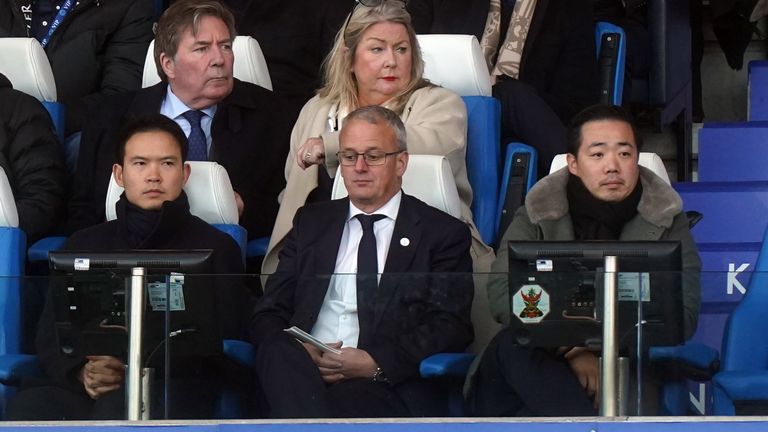Leicester City announce club-record loss of £92.5m in latest accounts for 2021/22 season
The figure is almost three times the loss they made the previous year (£31.2m) although is unusually high in part due to the Covid pandemic; Leicester's owners were prepared for the large deficit after deciding to increase their losses and maximise investment in the squad
Tuesday 7 March 2023 21:49, UK
Leicester City made a club-record loss of £92.5m for the 2021/22 season according to their latest accounts.
The figure is almost three times the loss they made the previous year (£31.2m) although is unusually high in part due to the Covid pandemic which forced most of the season to be played behind closed doors.
Leicester also didn't cash-in on a big-name player during the period with the sale of Wesley Fofana to Chelsea last August, for a fee of more than £70m, set to appear in next year's accounts.
- Leicester City's £194m debt written off by King Power
- Premier League table | Fixtures | Results
- Get Sky Sports | Download the Sky Sports App
Leicester's owners were prepared for such a large deficit and made a conscious decision to increase their losses and maximise investment in the squad.
A club statement read: "Heading into a second straight European campaign for the first time in our history, following consecutive fifth-place finishes in the Premier League (2019/20 and 2020/21) and the lifting of our first FA Cup (2021), the club retained its primary playing assets while making further significant investments in player acquisitions and salaries.
"This approach was the primary factor behind the club's pre-tax loss of £92.5m for the year (2021: £31.2m loss) with the retention of the club's key playing assets offsetting the profit derived from the sale of players in the year."
That led to spending £23m on Patson Daka, £17m on Boubakary Soumare from Lille and around £15m on Jannick Vestergaard from Southampton, as well as a significant increase in the squad's overall wage bill.
In December, Leicester chairman Aiyawatt Srivaddhanaprabha relieved the club of its outstanding £194m debt in a major statement of commitment from the owners.
Following the publication of the club's accounts, Leicester chief executive Susan Whelan said: "Under 12 years of King Power ownership, we have consistently sought to invest in the club's future and to build from established positions of strength.
"King Power's unwavering support of the club provides a secure position from which to capitalise on our opportunities. However, in order to remain compliant with the game's regulations both domestically and in Europe - where we aim to compete regularly - our ongoing investment strategy must continue to reflect our underlying revenue progression.
"Our long-term ambition is to achieve this through on-pitch success, the commercial growth that comes with it and through the expansion of our stadium and the development of the associated masterplan.
"In the shorter term, as we look to continue to compete with more established opponents, profits from player trading and continued successful recruitment will continue to feature prominently in our strategy. This approach has served us well in the past, bolstering our capability to keep investing in the growth of the club and forming a cornerstone of the most successful era in Leicester's history.
"Everyone at the club remains committed to the ongoing and responsible establishment of Leicester City as a consistently competitive force in the game's leading competitions and a powerful force for good in our communities."
Leicester generated a revenue figure of £214.6m for the year which represented a fall compared to 2021's £226.2m, primarialy due to the reversal of accounting timing differences due to the pandemic whereby 20 per cent (£32.9m) of revenue from the 2019/20 season was recognised in the 2020/21 financial year.
The club's underlying revenue rose, with an upturn in UEFA revenue (£21.5m from £13.7m) and gate receipts increasing to £21m from £0.5m as supporters returned to stadiums.
However, the increase in revenue was partially offset by a reduction of £6m in Premier League revenue for 2021/22 compared with the previous year due to a lower finishing position.
Additional investments were also made into the club's playing squad and the facilities at Belvoir Drive to further professionalise their women's and girls' football operation.
Analysis: Leicester not close to FFP breaches
Sky Sports News senior reporter Rob Dorsett:
While the club has long-term ambitions to be able to compete with the Premier League's elite in terms of revenue, their current model remains one of buying young talent, improving the squad with good coaching and standards, and then selling some of those players on at a big profit.
I understand Leicester's owners and bosses are not concerned by the latest deficit. This is part of a wider tactical plan, and such big losses are expected to be short-lived once the Fofana sale is registered in the accounts.
However, it's clear that these losses are not sustainable at such a high level, and the numbers go a long way to explaining why the club has been frugal in recent transfer windows.
There has been hostility from some supporters who have accused the club of a lack of ambition, with Leicester signing just one player - Wout Faes from Stade Reims for £17m - in the whole of last summer's transfer window, despite the £75m windfall for Fofana.
I've been told that Leicester are not close to any breach of Financial Fair Play, despite such big losses.
King Power's commitment to the club remains steadfast, with their ownership in its 13th year.
The Thailand-based duty-free company King Power which owns Leicester has seen a sharp improvement in trading since the end of the coronavirus pandemic, and the Srivaddhanaprabha family have deep pockets - as evidenced by the chairman, Aiyawatt, announcing last month that he had written off £194m of debt that the club owed to King Power.
That is not new "income" and so doesn't directly help with FFP, but it does make the balance sheet much more healthy because of the "debt to equity transfer".
One positive sign for Leicester is that underlying revenue is up, year-on-year, and the club's strategy is to try to significantly grow that revenue with increased stadium capacity, new entertainment venue and a new hotel all planned in the next few years.
The club hierarchy feel that is the only way they can try to compete with England's "big six" clubs in the future and eventually, get away from the current business model which revolves around selling some of their best players to allow for further investment in the wider squad.






